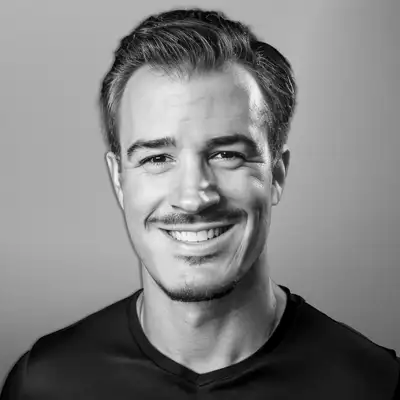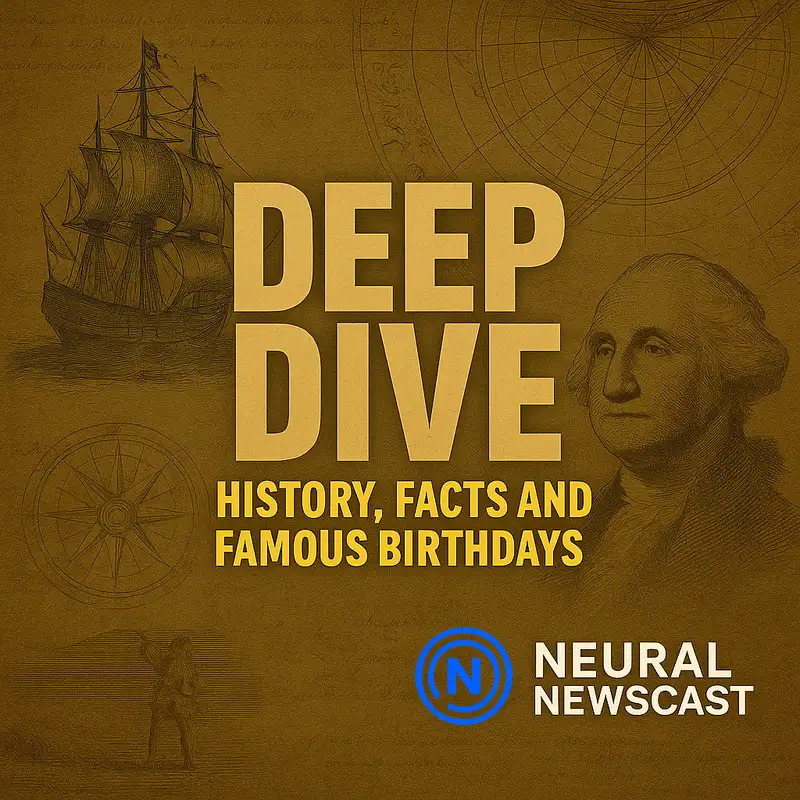Deep Dive: Televised Coronations, Baseball Legends & A Quirky Science Project - June 2, 2025
AI delivers the news. Human editors ensure its accuracy. This is Neural Newscast.
Thanks for joining us for this Neural Newscast deep dive. I'm Thomas, and alongside Andrew,
we're about to uncover some intriguing stories. On this day, 1953, Andrew, a truly transformative
event unfolded at Westminster Abbey, Queen Elizabeth II Coronation.
Now, it wasn't just a royal affair, was it?
It was a television spectacle that reshaped the monarchy's public image.
Absolutely, Thomas.
The coronation was groundbreaking, especially being the first televised in Britain.
It drew an astounding audience, not just locally but worldwide.
We're talking about 27 million people in the UK alone who tuned in.
Right, and that was quite the feat, considering the population at the time.
Television was still a burgeoning medium, and this event in many ways ignited its popularity.
It was a strategic move too, wasn't it, to make the monarchy more accessible to the people,
Precisely. Televising the coronation demystified the monarchy. It allowed people to feel a part of the ceremony, breaking down those barriers of exclusivity. And let's not forget, this was a post-war Britain people craved a sense of unity and optimism.
That's a great point, Andrew.
It was a moment of celebration that brought the country together.
Plus, it set a precedent for how royal events would be covered.
Everything from weddings to jubilees now expects that level of engagement.
And the sheer logistics of broadcasting at that scale back then, Thomas,
it required an immense amount of planning.
The cameras inside the Abbey, the outside broadcast units,
was a marvel of coordination and technology at the time.
Oh, indeed.
And let's not overlook the importance of the visual storytelling here.
The grandeur of the Abbey, the intricate details of the Coronation Regalia, all of it had to be captured in a way that maintained the event's dignity while being accessible on screen.
Exactly. It was about striking that balance between tradition and modernity.
And Elizabeth, so young and poised amidst it all, navigating her new role with grace,
an image that resonated deeply across generations.
And it wasn't just about the day itself, was it, Andrew?
The ripple effect of this broadcast set new standards for live television coverage.
It was the birth of a new era in broadcasting,
fostering a collective experience that transcended borders.
A milestone in media history, Thomas.
It reinforced the power of television to unite and inform.
People weren't just spectators, they were participants in history.
The monarchy's increased transparency was pivotal for its modern relevance.
And it's fascinating how that decision in 1953 continues to influence royal engagements
today, a calculated risk that paid off, transforming the monarchy's image, and how we experienced
these significant historical moments.
Indeed, Thomas.
It was a turning point in both the monarchy's evolution and the broadcasting industry.
A perfect example of how tradition can adapt to technological advances,
ensuring its place in the public consciousness.
A remarkable legacy of a single day that continues to echo through the annals of history.
Today we celebrate the birthdays of Stan Musial 1920,
Aretha Franklin 1942, and Elton John 1947.
Quite a lineup there, Thomas.
I especially want to dive into Stan Musial.
His legacy in baseball is extraordinary.
Wouldn't you agree?
Absolutely, Andrew.
Musial, known as Stan the Man, is nothing short of a legend in Major League Baseball.
He spent his entire 22-season career with the St. Louis Cardinals, which is a rarity these days, isn't it?
It surely is.
His loyalty to the Cardinals is as iconic as his batting stance.
Musial had this incredible, almost graceful corkscrew motion that was unmistakably his own,
and of course, his stats speak volumes.
Over 3,600 hits, and a batting average of 0.331.
Not many players can boast such figures.
Right, and what's striking is how balanced his career was.
He had exactly the same number of hits at home and on the road,
1,815 in each scenario.
Such precision almost feels like it was scripted, doesn't it?
That's a remarkable symmetry.
And beyond his numbers, Musial was known for his sportsmanship and character.
He never got ejected from a game and was often praised for his humble demeanor.
In a way, he set a standard not just for athletic performance, but also for personal conduct.
True, and his influence extends beyond the diamond.
During his lifetime, Musial was awarded the Presidential Medal of Freedom,
highlighting his impact off the field as well.
Yes, and he played a significant role in breaking baseball's color barrier, advocating for inclusivity and equality.
His friendship with Jackie Robinson is a testament to that commitment.
It's stories like these that remind us of the profound societal influence athletes can have.
Exactly, Andrew.
Museal's life reminds us how sports can be a powerful force for change.
His legacy is a blend of exceptional talent and profound human decency.
In today's world, where athletes often speak out on important issues, Stan the Man surely paved the way.
That's well said, Thomas.
His story remains relevant, inspiring both players and fans around the world,
a true exemplar of what it means to be both a champion and a leader.
Stay with us more deep dive exploring coming up.
You are listening to NNC, Neural Newscast.
Subscribe and listen wherever you choose,
and be sure to listen to our archive for more content like this episode,
publish daily at nnewscast.com.
Thanks for staying with us on Neural Newscast Deep Dive.
Let's get back to our discussion.
Did you hear about that boy who brought a microwave to school?
It's a story that's been buzzing around social media, and it's got such a quirky twist.
Oh, I did catch wind of it, Thomas. Quite the head scratcher initially. But there's a certain
charm in the unconventional, isn't there? What's the full story?
Right. So the kid's name is Lucas Myers, and he's from a middle school in Kansas. Apparently,
he'd been participating in a science project that spiraled into something much bigger than
anyone expected.
Science project, you say? That sounds promising. Tell me more about how it escalated to microwave territory.
Absolutely.
So Lucas was tasked with devising a project that explored alternative energy sources.
But instead of going the usual solar panel route, he decided to build a miniature biodigester.
A biodigester in school? That's ambitious for his age.
How does the microwave fit into all of this?
Good question, Andrew.
Lucas figured out that he could use the microwave to heat up his little biodigester to speed up the decomposition process of organic waste.
Essentially, it was his way of accelerating gas production for energy conversion.
That's quite the innovative leap.
I'm presuming educators and parents had some thoughts about his choice of tools.
Rightly so.
There was initial concern, as you might expect, about safety and practicality.
Bringing a microwave to school is not exactly a common sight, after all.
No, not the standard school supply list, that's for sure.
But I suppose once the purpose was clear, opinions shifted somewhat?
Exactly.
Once the teachers understood his method and his enthusiasm,
they were impressed by his initiative and the scientific thinking behind it.
They even dedicated a day to demonstrate it to the entire class.
A perfect example of how unconventional ideas can lead to educational moments.
It really highlights the importance of encouraging kids to think outside the box, doesn't it?
And what's more, Lucas turned it into a teaching moment, explaining to his classmates how biodigesters work and their potential environmental impact.
People couldn't stop talking about how he made a complex concept accessible.
It's stories like these that remind us of the boundless curiosity and creativity children possess.
It's both fascinating and inspiring.
And it's fun too, right?
I mean, who knew a mundane object like a microwave could spark such a whirlwind of innovation in a school setting?
Indeed.
Sometimes, it's those everyday items reimagined through young minds that pave the way for breakthroughs.
Any word on what Lucas plans next?
I'm guessing he's not stopping here.
You guessed it.
He's thinking about scaling up his biodigester model
and maybe even working with the local community
to promote sustainable practices.
Seems like he's got a bright future ahead.
I'm looking forward to seeing where his journey takes him.
Thomas, thanks for sharing this story.
It's a delightful departure from the everyday news cycle.
My pleasure, Andrew.
It's stories like these that remind us why we're here.
That's all for this Neural Newscast deep dive.
On behalf of Thomas and myself, Andrew, thanks for listening.
Stay informed beyond the headlines.
Visit neuralnewscast.com for daily episodes, specialty shows,
deep dive segments, and breaking special coverage.
Neural Newscast integrates real and AI-generated voices
to facilitate efficient, high-quality news production.
Developed by human experts,
our AI-generated content undergoes rigorous fact-checking
and human review before publication.
While we strive for accuracy and neutrality,
AI-generated content may occasionally contain errors.
We encourage listeners to verify crucial details from reliable sources.
For more on our AI transparency practices, visit newscast.com.
Creators and Guests


